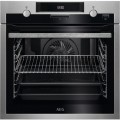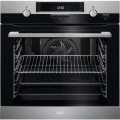Cooking temperature
The cooking temperature range allows you to understand which special tasks are subject to the oven. The lower temperature from which the oven starts heating, usually, is in the range of +30 to +50 ˚C. So, for example, the minimum heating temperature at
+30 ˚C allows you to defrost products. Models with a minimum of
40 ˚C and
50 ˚C allow you to heat ready meals, heat tableware (before serving), dry crackers, etc.
Number of modes
The number of cooking modes provided in the design of the oven. In this case, the cooking mode means the general opertaion mode — for example, “heating”, “heating + convection”, etc. Accordingly, this indicator strongly depends on additional equipment (see "Features"). However, even in similar models, the number of modes may be different. In general, the
more cooking modes, the more cooking options, the easier it will be to choose the optimal mode for a specific situation.
Guides
Type of guides for installing baking sheets that are used in the oven.
—
Frame. Classic guides have the form of slots with protrusions in the side walls of the oven. This design is simple and inexpensive. However, it is not very convenient — when removing baking sheets, you have to pull your hand into a heated oven, which means you will need a mitten or potholder. And the extraction itself may require effort, especially if the guides are dirty and the trays go tight in them.
—
Telescopic. Retractable guides on which the baking sheet “leaves” the oven, usually, immediately when the door is opened. Such devices are more convenient than frame ones, but they are more expensive and not suitable for all situations (for example, sometimes to check a dish you only need to open the lid without pulling it out). Therefore, in most models,
telescopic guides are only on one level. But
telescopic guides on two levels or even
three levels already classifies the device as a top segment.
Oven cleaning
The type of inner cleaning provided in the oven. Note that pollution has to be removed with a rag or sponge, but modern ovens often provide various tricks that facilitate the process. The options might be:
—
Catalytic. A special wall coating is used in ovens with this cleaning method: it breaks down fats and other stubborn dirt into constituent elements that can be easily removed. The effectiveness of such a coating decreases over time, but it is enough for at least several years of full use. It should be noted that the catalytic coating can be implemented by applying it to special removable plates that are installed on the back or side walls of the oven chamber.
—
Steam cleaning. Cleaning with hot steam, which softens dried-on dirt and partially breaks down fats. In some models, there is a built-in steam generator for this, in others it is enough to put a container of water in the working chamber and turn on the cleaning program.
—
Pyrolytic. Cleaning by heating the chamber to a very high temperature — about 500 ° C. At this temperature, most of the contaminants are incinerated into ash, which can then be easily removed. Pyrolytic cleaning is considered the most effective, but ovens with this function are expensive, time consuming, require significant electricity/gas consumption, and can lead to unpleasant odors.

